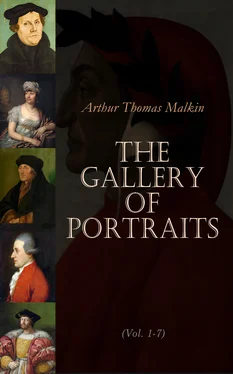The father of Lagrange, luckily perhaps for the fame of his son, was ruined by some unfortunate speculation. The latter used to say, that had he possessed fortune, he should probably never have turned his attention to the science in which he excelled. He was placed at the College of Turin, and applied himself diligently and with enthusiasm to classical literature, showing no taste at first for mathematics. In about a year he began to attend to the geometry of the ancients. A memoir of Halley in the Philosophical Transactions, on the superiority of modern analysis, produced consequences of which the author little dreamed. Lagrange met with it, before his views upon the subject had settled: and immediately, being then only seventeen years old, applied himself to the study of the modern mathematics. Before this change in his studies, according to Delambre [7], after it, according to others, but certainly while very young, he was elected professor at the Royal School of Artillery at Turin. We may best convey some notion of his early proficiency, by stating without detail, that at the age of twenty-three we find him—the founder of an Academy of Sciences at Turin, whose volumes yield in interest to none, and owe that interest principally to his productions—a member of the Academy of Sciences at Berlin, an honour obtained through the medium of Euler, who shortly after announced him to Frederic of Prussia as the fittest man in Europe to succeed himself—and settling, finally, a most intricate question [8]of mathematics, which had given rise to long discussions between Euler and D’Alembert, then perhaps the two first mathematicians in Europe. He had previously extended the method of Euler for the solution of what are called isoperimetrical problems , and laid the foundation for the Calculus of Variations, the most decided advance, in our opinion, which any one has made since the death of Newton.
In 1764 he gained the prize proposed by the Academy of Sciences for an Essay on the Libration of the Moon; and in 1766, that for an Essay on the Theory of the Satellites of Jupiter. In the former of these we find him, for the first time, using the principle of virtual velocities , which had hitherto remained almost a barren truth, but which he afterwards made, in conjunction with the principle known after the name of D’Alembert, the foundation of the whole of mechanical science.
In 1766, Euler, intending to return to St. Petersburg, resigned the situation which he held at the Court of Berlin, that of director of the physico-mathematical class of the Academy of Sciences. Frederic offered this place to D’Alembert, who refused it for himself, but joined with Euler in recommending Lagrange. The King of Prussia acceded to their suggestion, and Lagrange was invited to establish himself at Berlin, with a salary equivalent to 6,000 francs.
Lagrange remained at Berlin till after the death of Frederic. He here married a lady who was related to him, and who came from Turin at his request. She died after a lingering illness of several years, marked by the most unceasing attention on the part of her husband, who abandoned his pursuits to devote himself entirely to her during her illness. Nevertheless the period of his sojourn at Berlin is perhaps the brightest of a life, most years of which, from the age of eighteen to that of seventy, were sufficient to ensure a lasting reputation. He here laid the foundation of his Theory of Functions, of his general method for determining the secular variations of the planetary orbits; and here he wrote his Mécanique Analytique.
At the death of Frederic, he found that science was no longer treated with the same respect at the Court of Berlin. He had found from the commencement of his stay there, that foreigners were looked upon with dislike, and his spirits had not recovered the loss of his wife. Many advantageous offers were made to him by different courts, and among the rest by that of France. Mirabeau, who was then at Berlin, first pointed out to the ministers of Louis XVI. the acquisition which was in their power. Lagrange removed to Paris in 1787, and remained there till his death.
He was then weary of his pursuits, and it is said that his Mécanique Analytique, which he had sent from Berlin to be printed in Paris, lay unopened by himself for more than two years after its publication in 1788. He employed himself in the study of ecclesiastical and other history, of medicine, botany, and metaphysics. When the discoveries of the chemists changed the theory and notation of their science, or rather created a science where none existed before, he threw himself upon the new study with avidity, and declared that they had made it easy; as easy as algebra .
In 1792, being then fifty-six years of age, he married Mlle. Lemonnier, daughter of the astronomer of that name, and daughter, grand-daughter, and niece of members of the Academy of Sciences. This lady well deserves honourable mention in every memoir of Lagrange, for the affectionate care which she took of his declining years.
When, after the subversion of the monarchy, a commission was appointed to examine into the system of weights and measures, Lagrange was placed at its head. In this post he continued, not being included in the purification , which three months after its formation, deprived the commission of the services of Laplace, Coulomb, Brisson, Borda, and Delambre. He took no part in politics, and appears to have given no offence to any party; hence, when the government of Robespierre commanded all foreigners to quit France, an exception was made in his favour by the committee of public safety. All his friends had advised him to retire from the country; and the fate of Lavoisier and Bailly was sufficient to show that scientific talents of the most useful character were no protection. He now regretted that he had not followed their advice, and even meditated returning to Berlin. He did not, however, put this scheme in execution; and as the Normal and Polytechnic Schools were successively founded, he was appointed to professorships in both. His Leçons, delivered to the former institution, appear in their published series, and among them we find the Leçons sur la Théorie des Fonctions, which has since appeared as a separate work.
It is almost needless to say, so well as the public know how science was encouraged under the Consulate and the Empire, that Lagrange received from Napoleon every possible respect and distinction. The titles of senator, count of the empire, grand cordon of the legion of honour, &c. were given to him. It is also gratifying to be able to add that his abstinence from political engagements has left his memory unstained by such imputations as, we know not how justly, rest upon that of Laplace. We might have omitted to state that he belonged to all the scientific academies of Europe; but that it is necessary, for the sake of the scientific reputation of this country, to correct an inadvertence into which the able author of the ‘Life of Lagrange,’ in the Biographie Universelle, appears to have fallen. He states that Lagrange was not a member of the Royal Society of London [9]. The fact is, that he was elected in 1798, and his name continued on the list of foreign members all the remainder of his life.
About the end of March, 1813, Lagrange was seized with a fever, which caused his death. He had previously been subject to fits of fainting, in the last of which he was found by Madame Lagrange, having fallen against the corner of a table. He preserved his senses to the last, and on the 8th of April conversed for more than two hours with M.M. Monge, Lacepède, and Chaptal, who were commissioned by the Emperor to carry him the grand cordon of the order of the Réunion . He then promised them, not thinking himself so near his end, full details of his early life. Unfortunately this promise remains unfulfilled, as he died on the 10th of April, in his seventy-eighth year. His father had died some years before him at the age of ninety-five, having had eleven children, all of whom, except the subject of this memoir, and one other, died young. Lagrange himself had no children. His private character, as all accounts agree in stating, was most exemplary. His manners were peculiarly mild, and though occasionally abstracted and absent, he was fond of society, particularly that of the young. In the earlier part of his life he was attacked in an unworthy manner by Fontaine, who at the same time boasted of some discovery which he attributed to himself. Lagrange replied with the urbanity which always accompanied his dealings with others, and while he overthrew the claim of his opponent, he repaid his incivility by the compliment of admitting that his talents were such as would have enabled him to attain the discovery, if it had not been previously made. Such moderation is rare, and as might be expected, it was accompanied by the utmost modesty in speaking of himself. In the latter half of his life, it would have been affectation in him to have denied his own powers, or spoken slightingly of his own discoveries; nor do we find that he ever did so. In giving opinions or explanations, he broke off the moment he found that his ideas were not as clear or his knowledge as definite, as he had thought when he begun; concluding abruptly with Je ne sais pas, Je ne sais pas . Among his studies, music found a place; but, though pleased with the art, he used to assert that he never heard more than three bars: the fourth found him wrapped in meditation, and by his own account, he solved very difficult problems in these circumstances. He would, therefore, as M. Delambre remarks, measure the beauty of a piece of music by the mathematical suggestions which he derived from it; and his arrangement of the great masters would be not a little curious.
Читать дальше












